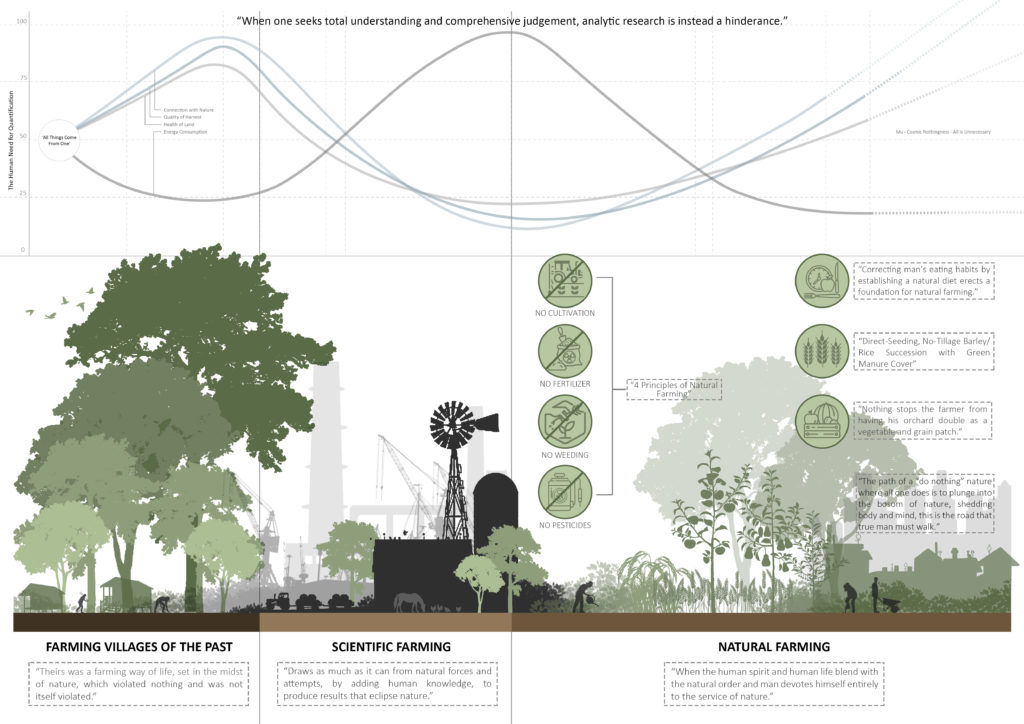This blog is a review of the book, The Natural Way of Farming: The theory & practice of Green Philosophy by Masanobu Fukuoka. The Book is a deep description on different ideologies and process developed by the author through practice and application.
“When the human spirit and human life blend with the natural order and man devotes himself entirely to the service of nature.”
Beginning from the context of farming villages of the past, Fukuoka explains how these villages were in-step with natural farming and that their relationship with nature was one that embodied the idea of Mu (cosmic nothingness) which states that all is unnecessary. As industrialization accelerated and in particular following WWII, agriculture in Japan shifted from labor-intensive to capital-intensive, which introduced higher degrees of industrialization on farms, as well as the use of chemical fertilizers and pesticides.
This shift to scientific farming introduced a relationship with nature that attempts to understand it through a perspective that assumes humans are above nature and in a position to manipulate nature at will in order to maximize human benefit as it relates to capital and efficiency. This problematic approach has further alienated humans from the processes of nature. It has produced ever-deepening negative consequences on the health of the countless interconnections and relationships that occur in nature.
Fukuoka states how humans are not in a position to know nature, and how our perspective must shift from one of arrogance to one of humility. Essentially, nature is far too interconnected and complex for humans to fully understand, no matter how scientific or seemingly sophisticated the approach is. The best way forward is for humans to surrender to nature and let nature’s processes lead the way.

Transitioning from scientific agriculture to a natural way of farming prioritizes a ‘Do-Nothing’ approach that encourages simplification and reduction of human effort and knowledge in order to break free from the ill-conceived visions and concepts humans have in relation to farming. This approach includes 4 key principles that focus on letting natural processes do the work: No Cultivation, No Fertilizers, No Weeding, and No Pesticides.
No cultivation states how plowing is unnecessary and that it actually does the opposite of loosening the soil, as it instead compacts soil and reduces porosity. The no fertilizer principle states how plants grow without fertilizer naturally, and how there are many long-term consequences that using chemical fertilizer has on soil and plant health. The no-weeding principle argues that we must make use of the weeds and their abilities to enrich the soil through root penetration. No pesticides make the argument that we do not know the full extent of the pesticides we use and that it creates a never-ending cycle of production of new pesticides for new pests.
Fukuoka had success in applying the principles of natural farming on his own farm. In particular in regards to planting rice and barley on the same area of land; using clover as a ground cover, fertilizing the land by spreading the barley straw over the heads of rice and vice versa scattering uncut rice straw over the field in preparation for the barley season. Additionally, he had a successful multi-crop orchard where he planted vegetables and grains interspersed among the trees.
The graph in the diagram attempts to show how some variables in the book (connection with nature, quality of the harvest, the health of land, and energy consumption) change in relation to the respective farming practices. The variables are shown coming from the same source, and eventually fading out, showing that ultimately, the human urge for quantification is futile, and instead an approach of observation and dialogue with nature is preferred.
Additional Books to refer to:
The One-Straw Revolution: An Introduction to Natural Farming by Masanobu Fukuoka

